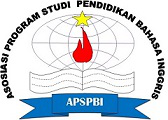The Implementation of Team-Based Learning for English Department Students
Abstract
The purpose of this study is to explore English Education Department students’ perceptions and experiences about the implementation of Team-Based Learning for their class. The study was carried out using a qualitative methodology, and five students were used as the sample population for an interview. The total number of participants who took part in this study was 33 students who came from the second grade from semester 6. Participants were given a close-ended questionnaire to collect their perceptions about team-based learning. According to the survey, the majority of students believed that group projects enhanced learning, although some challenges persisted. As a consequence of the interview findings, it was discovered that several of the issues raised by the students were brought on by the group's members. Some students preferred working by themselves had varying levels of skill, found it challenging to speak with others, did not respect differing viewpoints, did not want to collaborate (students who study more slowly), and did not want to learn.
Keywords
Full Text:
PDFReferences
Alavi, M. (1994). Computer-Mediated Collaborative Learning: An Empirical Evaluation. MIS Quarterly.
Arumugam, N., Rafik-Galea,S., Mello, G.D., & Dass, L.C. (2013). Cultural influences on group learning in an ESL classroom. Review of Journal Studies, 5(2), 81-89
Beebe, S.A., & Masterson, J.T. (2003). Communicating in small groups. Pearson Education Inc. Boston Massachusetts.
Brown, D. (2001). Teaching by Principles: an Interactive Approach to Language Pedagogy. Y: Longman
Daba T, E. S. (2017). Student perception on group work and group assignments in classroom teaching: the case of Bule Hora University second year biology students, South Ethiopia: An Action Research . Educational Research and Reviews.
Djamaluddin, A., & Wardana. (2019). Belajar Dan Pembelajaran. In CV Kaaffah Learning Center.
Elnibras, M. (2022). Student ’ s perception and satisfaction toward A Modified Online Team-Based Learning ( A Pilot Study ). 45(02), 5293–5299.
Gillies, R.M. (2003). Structuring cooperative group work in classrooms. International Journal of Educational Research, 39, 35-49
Gomleksize, M.N. (2007). Effectiveness of cooperative learning (Jigsaw II) method in teaching english as a foreign language to engineering students (case of Firat University, Turkey). European Journal of Engineering Education, 32(5), 613-625).
Jackson, S. E.-H. (2015). Toward developing human resource management systems for knowledge-intensive teamwork. Research in Personnel and Human Resources Management.
Livingstone, D. a. (2000). Group project work and student-centred active learning: two different experiences. Studies in Higher Education.
Pardamean, B., Prabowo, H., Muljo, H., Suparyanto, T., Masli, E., & Donovan, J. (2017). Team based learning as an instructional strategy: A comparative study. New Educational Review, 50(4), 134–145. https://doi.org/10.15804/tner.2017.50.4.11
Parrish, C. W., Guffey, S. K., & Williams, D. S. (2021). The impact of team-based learning on students’ perceptions of classroom community. Active Learning in Higher Education. https://doi.org/10.1177/14697874211035078
Tyas, L. W. (2017). Perbedaan Metode Team Based Learning Dengan Metode Ceramah Terhadap Peningkatan Kemampuan Berpikir Kritis Mahasiswa Keperawatan. Strada Jurnal Ilmiah Kesehatan, 6(2), 1–7. https://doi.org/10.30994/sjik.v6i2.5
Vygotsky, L. (1978). Mind in Society: The development of higher psychological processes. Cambridge, MA: MIT Press.
Whatley, J. G. (1999). Intelligent agents to support students working in groups online. Journal of Interactive Learning Research.
Yuberti. (2014). Teori pembelajaran dan pengembangan bahan ajar dalam pendidikan. In Psikologi Pendidikan (Vol. 1).
Zschocke, K., Wosnitza, M., & Bürger, K. (2016). Emotions in group work: insights form an appraisal-oriented perspective. Eur J Psychol Educ (2016) 31:359-384. DOI 10.1007/s10212-015-0278-1
DOI: http://dx.doi.org/10.20527/jetall.v6i2.16637
Article Metrics
Abstract view : 256 timesPDF - 173 times
Refbacks
- There are currently no refbacks.
This journal is indexed in:


This Journal is listed in:
 Journal of English Teaching, Applied Linguistics and Literatures (JETALL)
Journal of English Teaching, Applied Linguistics and Literatures (JETALL)








.png)



1.png)
